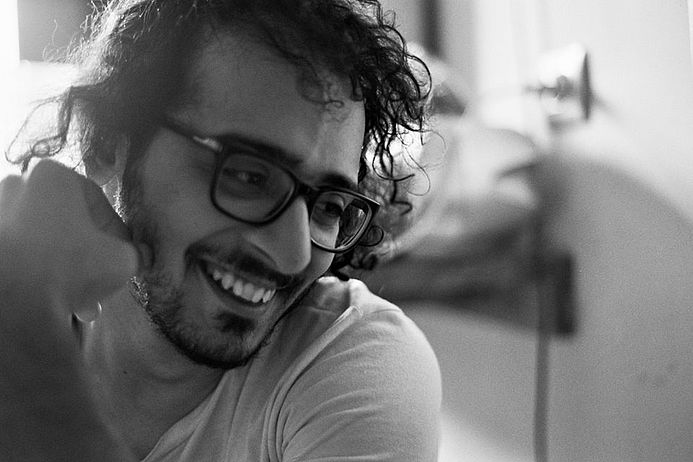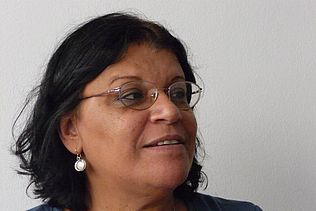Chancellor Angela Merkel visited Egypt in the beginning of March 2017 – one of several stops in North Africa in order to recruit these governments to support combating refugee and migration movements to Europe. Around the same time the Egyptian foreign minister Sameh Shoukry was invited to discuss security and defense issues as well as migration with EU foreign ministers and ministers of defense.
Egypt is considered to be the region’s key state. It is an important transit country for people from Sudan, Eritrea or Somalia. Syrians as well try to reach Europe via Egypt. More than 10 percent of the 180.000 refugees who arrived in Italy in 2016 started crossing the Mediterranean from Egypt. Most refugees start from shattered Libya, but negotiations with Libya are nearly impossible. However, Egypt is trusted to implement a deal similar to the EU-Turkey-Deal. But resembling Turkey, a number of its own citizens are leaving Egypt due to the condition of human rights.
Ramona Lenz spoke to Nader G. Attar from medico’s Egyptian partner organization Center for Refugee Solidarity about refugees’ and migrants’ situation in Egypt and EU’s and Germany’s efforts to involve the country in the European asylum and migration politics.
Bundeskanzler Merkel’s main topics are the strengthening of the coastguards, the fight against smugglers of human beings, the readmission of migrants and refugees from Germany and also supporting Egypt to stabilize the neighboring countries Libya and Sudan. What do you think about Merkel’s agenda?
Nader G. Attar: I think the problem we are facing right now is that Germany and other European countries unfortunately use a preventive approach instead of a corrective approach. It would be better to use a corrective approach. This means to understand why people are leaving countries like Egypt and Libya. We are talking about refugees and immigrants who don’t have rights, no access to health care and education and who are being mistreated and detained innocent in so many cases.
With a corrective approach we would try to understand what’s going on and push the government in order to enhance the people’s situation. The preventive approach consists of just saying “seal the borders” and “strengthen the coastguards” to prevent people from coming. But there is one thing we should have learned in all of these years: No matter how much you strengthen the borders, it is not going to prevent people from leaving if they are hopeless. But the preventive approach is getting stronger now as a lot of governments are being challenged by right wing politics and try to compete with them.
Not only several European countries but also the European Union tries to enforce cooperation with Egypt and other African countries of origin or transit countries. They follow a pattern of refusing development projects to influence migration management and to make governments cooperate in border security. Do you think the Egyptian government is interested in this kind of cooperation in order to get funding? Or would the government prefer migrants and refugees leaving the Egypt to reach Europe?
I believe that countries in the Middle East and North Africa, for example Libya, Egypt, Lebanon, Jordan, have used refugees and immigrants as a form pressure against Europe and international governments for years. And all the regimes don’t care about the welfare and the benefits of refugees and migrants. This happened in Egypt with Mursi and happened with Sisi. Sisi has been using immigrants and refugees as a way to create fear at a local and international level. I really feel upset that the EU is following the theory and rhetoric that Egypt is the gate that has to be closed to keep terrorist groups from Europe and should be supported and funded.
I think that the EU is doing a mistake now but has been doing the same mistake for years with Gaddafi and with all the past regimes. Europe is shedding a blind eye on the abuses and violations that happened to the refugees and thinks that giving money to these governments would contribute to solve the problem. But the problem is not being solved – as seen in bad health care in the Zaatari camp in Jordan and in Lebanon, where the Palestinians are not allowed to work legally until today although they are in the country since the 50s and 60s. All these issues have to be solved once and for all, not just supporting governments and strengthening the borders or giving money, that will never solve the problem.
How is the current situation for refugees and immigrants in Egypt?
The situation in Egypt is complex. First of all, Egypt doesn’t have a culture of refugees unlike Lebanon; they have been living with refugees for years. The problem is that there was a shift in the treatment of refugees. In Mursi’s time it was easy for any Syrian to come to Egypt, they were relatively well and even the rate of people leaving Egypt through the Mediterranean was very low. Now refugees are used as a tool to create hate and fear in the international and the local community.
And the issue here is that they do lack the basic rights. When it comes to the schools, it’s really a problem, there is a high of numbers of students and it’s very hard to be accepted in general and it’s even harder for Syrian refugees. And most of them can’t afford private schools. Also we have a problem with xenophobia in Egypt since the military took over: there are a lot of incidents where Egyptians were racist and were discriminating against Syrian people, stating they were taking their jobs, taking their money, similar to the xenophobia in European countries. There is no proper approach from the Egyptian government or the Egyptian parliament towards this problem.
Another problem is the detention of refugees which we documented. Whenever a group is arrested for trying to leave the country there are long term detentions of these people including women and children. Sometimes it goes up to a year with no charges at all. So we demand to release them because there is no crime but the state security keeps on detaining them, stating they are a threat to national security. But how can a two month old child be a threat to national security? The tactic is to keep them detained until they chose themselves to be deported.
Which role do agencies like UNHCR or the International Organization for Migration (IOM) play in Egypt?
The problem is there is a complete shut down on civil society in Egypt. The NGOs that used to work for refugees are completely shut down now. The organization which exposed the scandal of refugees being killed for their organs was closed. You have also Human Rights Watch was closed as well as Nadeem Centre for the Rehabilitation of Victims of Violence and Torture. That caused a vacuum when it comes to assistance and documentation of problems. At the moment only organizations such as the IOM and the UNHCR are working with refugees. I do have my criticisms about this situation. They want to play it safe with the government at many times. That’s in my opinion an important difference to private NGOs because they are more edgy and more critical and don’t play politics with the government.
What is your work at the moment?
We are trying to extend our focus on African refugees because these are the forgotten refugees. We live in a world right now where we came to navigate a priority in misery. So now the Syrian refugees are focused, but let’s be honest, the African, the Somali, the Sudanese are suffering from the same kind of violations and abuses, in some countries even longer than Syria. But still, the focus is on Syrian refugees now. Other groups are being completely neglected. Many European countries prioritize Syrian asylum applications and applications of Afghanis and Somalis fall behind.
What about Egyptians leaving the country? The current number is low, could this change in future?
In the past three years there was a wave of Egyptians leaving to Turkey, for example Muslim Brothers. The second group is activists, writers and journalists, the people who are affected by the repression against the civil society. I don’t know what kind of cooperation or deal that can be discussed by the EU before discussing this very important issue of shutting down of the civil society. If the EU body, if Germany would support and fund Egypt there is a big importance to have a strong civil society that can monitor the actions of this government and where the fund is going.
Interview: Ramona Lenz
Edited by Anne Wolter


